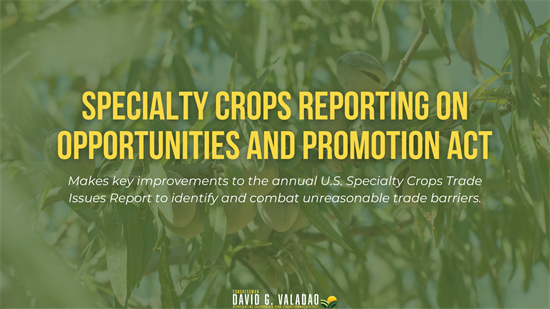- Home
- About
-
Services
- Art Competition
- Community Project Funding Map
- Congressional App Contest
- Congressional Certificate
- Event Request
- Flag Request
- Grants
- Grant Letters of Support
- Help with a Federal Agency
- Inauguration
- Internships
- Kids Page
- Meeting Request
- Service Academy Nominations
- Tour Requests
- Vietnam Veteran Commemoration
- Government Shutdown FAQ
- Issues
- Media
- Contact

Press Releases
Valadao, Bonamici Introduce Bipartisan Legislation to Boost Specialty Crop Exports
Washington,
November 14, 2023
|
Faith Mabry
Tags:
Agriculture
Reps. David G. Valadao (CA-22), Suzanne Bonamici (OR-01), and Elissa Slotkin (MI-07) introduced the Specialty Crops Reporting on Opportunities and Promotion Act (Specialty CROP Act). The bill makes key improvements to the annual U.S. Specialty Crops Trade Issues Report to identify and combat unreasonable trade barriers more effectively.
WASHINGTON – Today, Reps. David G. Valadao (CA-22), Suzanne Bonamici (OR-01), and Elissa Slotkin (MI-07) introduced the Specialty Crops Reporting on Opportunities and Promotion Act (Specialty CROP Act). The bill makes key improvements to the annual U.S. Specialty Crops Trade Issues Report to identify and combat unreasonable trade barriers more effectively. Specialty crops are a cornerstone of California agriculture – the state produces the most specialty crops in the country both in quantity and diversity, with over 400 different commodities produced in the state per year. California is the top exporter of a wide range of specialty crops, including almonds, pistachios, and table grapes. “Specialty crop producers in California have faced many challenges over the last few years – from supply chain backlogs at our ports, rising input costs, labor shortages, and drought,” said Congressman Valadao. “Many of our California-grown specialty crops rely on customers overseas, but too often face unfair trade barriers that make it difficult to stay competitive. This bill will better identify trade obstacles so that American-grown specialty crops have fair access to foreign markets.” “Oregon is world famous for our specialty crops, and products like blueberries and hazelnuts make up a significant portion of our state's export economy. Unfortunately, growers face many barriers to foreign markets, which limit their competitiveness,” said Congresswoman Bonamici. “The Specialty CROP Act will improve the USDA’s existing specialty crops trade report to better translate its findings into meaningful action and policy. I’m pleased to introduce this important bipartisan legislation with Senator Wyden and several colleagues in the House and Senate.” Specialty crops – fruits, vegetables, nuts, and more – are vital to Michigan’s economy and to the livelihoods of the farmers that grow them,” said Congresswoman Slotkin. “That’s why I’m co-leading the Specialty CROP Act. This bipartisan bill will help growers access foreign markets, while also analyzing potential barriers to success – a straightforward, common-sense step that will support our agriculture community.” The Senate companion version of the legislation was introduced today by Senate Finance Committee Chair Ron Wyden, D-Ore., and Ranking Member Mike Crapo, R-Idaho. The legislation makes improvements to the U.S. Specialty Crops Trade Issues Report, including to: o Explicitly requires participation and engagement from the Office of the United States Trade Representative (USTR); o Highlight specific trade barriers that limit the export competitiveness of specialty crops in specific markets, including tariff and non-tariff barriers; o Include an assessment of whether each trade barrier is subject to a U.S. FTA or international agreement; o Include specific information with respect to actions taken, or expected to be taken, by the U.S. government to address or resolve each trade barrier; and o Require a request for comment from both the public and the Agricultural Trade Advisory Committee (ATAC) for Trade in Fruits and Vegetables.
Read a one-page summary of the bill here. Read the full bill text here.### |

